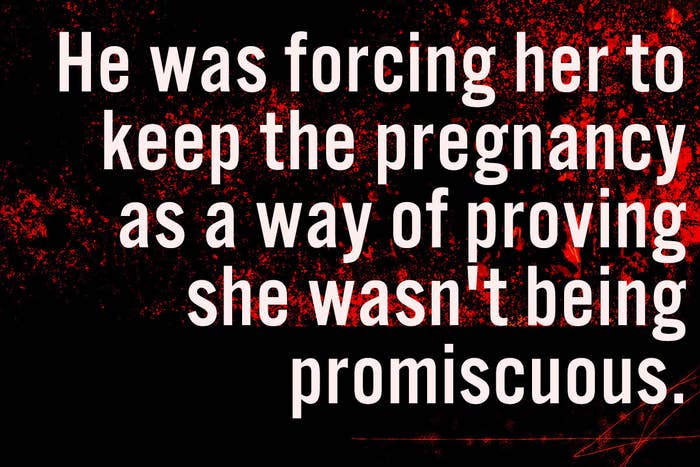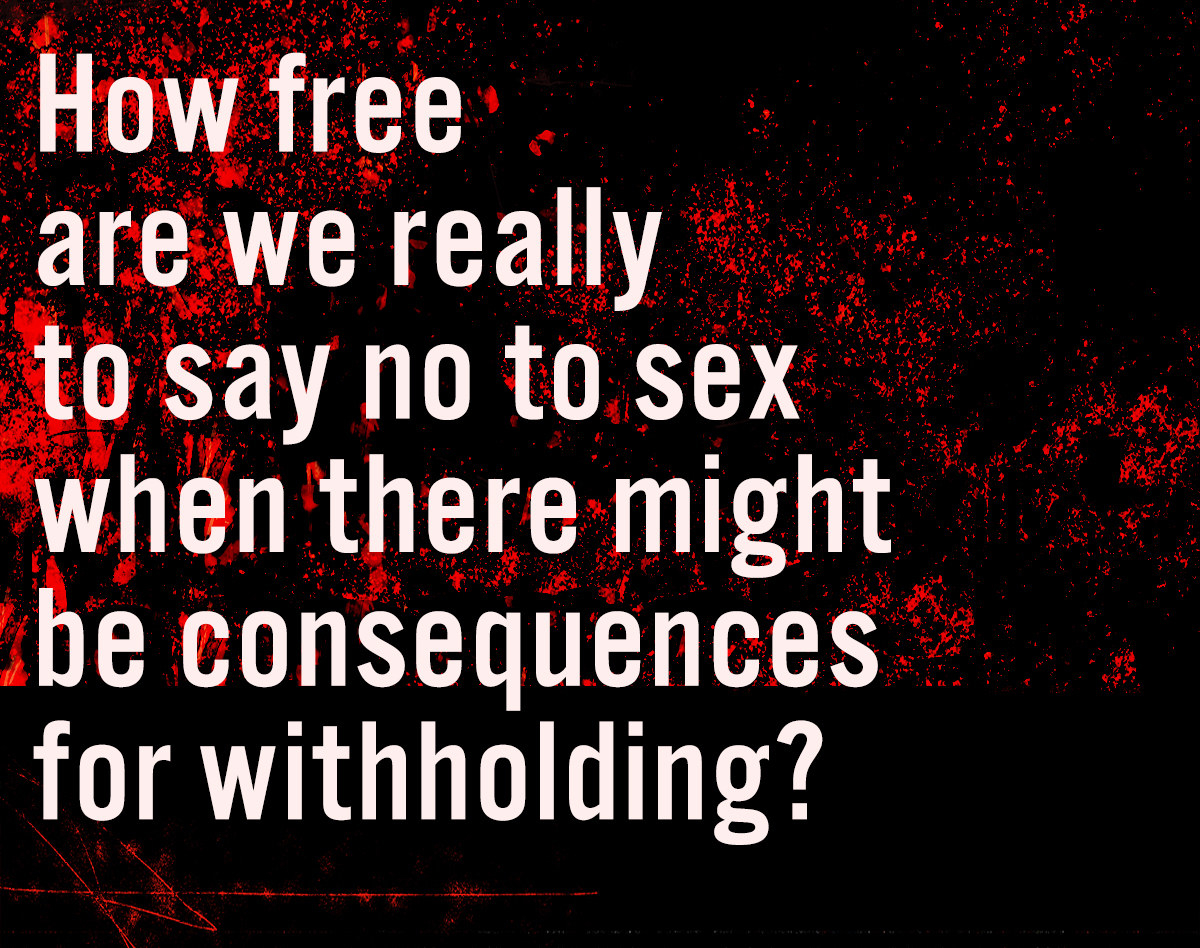Reproductive coercion is when someone controls whether, and when, you fall pregnant.
It is when someone forces you to continue a pregnancy you don't want, or terminate a pregnancy that you did want.
It can be contraceptive sabotage. It can be emotional blackmail. It can be rape.
It is any behaviour aimed at establishing and maintaining power and control by restricting a woman’s reproductive autonomy, denying her control over decisions related to her reproductive health, and limiting her access to reproductive health options.
"This can involve denying a woman control in decision-making, or pressuring her to become pregnant, sabotaging her contraception, and pressuring her about the outcome of her pregnancy," Liz Price, a project officer at pro-choice counselling service Children by Choice in Queensland, told BuzzFeed News.
"There are also issues of physical violence that get in the way of women being able to meaningfully consent to sex, and if we live in fear of other forms of violence, how free are we really to say no to sex when there might be consequences for withholding?"
Research indicates that unplanned pregnancy is more common among women experiencing domestic violence.
Pregnancy can be a trigger for domestic violence, and of women who have experienced violence during pregnancy by a previous partner, 25% indicated that the violence first occurred during the pregnancy.
"Women who experience violence are significantly over-represented in the women who seek abortion care," Price said.
"About 34% of the work the counselling team does involves women for whom violence is a factor in their situation, and a third of those women disclose reproductive coercion."

Reproductive coercion does not have to be physical, Price said, and can involve emotional manipulation.
"We had one young woman [with an unwanted pregnancy] who told us that her partner repeatedly said things like: 'You don't want to be pregnant with me because that will mean that the other guys you're screwing around with won't want to have sex with you'," Price said.
"So he was forcing her to keep the pregnancy as a way of proving she wasn't being promiscuous."
Price said women in their 20s were most likely to experience coercion, and were more likely to go ahead with a pregnancy as a result of the violence.
Price said service providers should be aware of the role a partner might play in the decision-making process, and that healthcare services could help address reproductive coercion by "having posters up in the foyers" and "seeing women on their own for the first appointment".
Marie Stopes Australia senior nurse Kitty Grozdich works out of a clinic in Westmead in Sydney's west and said she saw women daily whose partners controlled their access to contraception, often via financial abuse.
"[Before a termination of pregnancy] we go through a woman's entire obstetric history and talk about what their other pregnancies have been like, and what their contraceptive history is, and what their contraceptive plan going forward will be," Grozdich told BuzzFeed News.
"So if a person comes in and says they have had multiple pregnancies and have been using the withdrawal method, we will offer to provide, say, a long-acting reversible contraceptive like an implant which might cost around $90."
In some cases the partners "think they are infallible" and that "they'll put the condom on right or they will pull out next time", Grozdich said.
"But their partner might say that it is too expensive, or that he doesn't want something 'inside' of her and that he will remind her to take the pill.
"In other instances, the partner isn't there for a termination, but the woman has to call him to get permission to use a credit card or get him to pay for the procedure."
Coercion could work "both ways", Grozdich said, in which partners were coercing a woman to terminate an unplanned pregnancy.
"One patient told her partner she was having a termination because he was physically abusive, and she basically wanted us to lie for her and tell her partner that she was having the procedure, and take his payment even though she hadn't stepped foot in the clinic."
This could have been the case for Sydney woman Yasmine (not her real name).
Her ex-boyfriend pursued her for months before she agreed to date him in 2015 when she was 18-years old.
"He had said 'I love you' before we had even dated and was obsessive about seeing me," she told BuzzFeed News.
The couple had sex once with a condom but Yasmine's partner told her he "hated" it and wouldn't wear one again.
"He refused to wear condoms and made me have sex sometimes eight times a day, and it was just easier for me to [have sex than refuse it]," she said.
"He made sure he came in me every time."
Yasmine was worried about getting pregnant but her partner had "already named" their hypothetical children.
"My plan was that if I fell pregnant I would have an abortion and tell him I had had a miscarriage, because if he knew the truth he would have hit me."

It was important to see a woman without her partner at the first appointment and use only accredited interpreters (never family and friends) to translate if there were language barriers, said a senior social worker at South Australia's Pregnancy Advisory Centre, who spoke on the condition of anonymity.
"Women [who sought to terminate an unplanned pregnancy] are often clearly in a situation that is identified as reproductive coercion because she is being pressured to say 'yes' to sex which she identified as consenting, because it was easier than saying no," the worker said.
Almost 30% of Children by Choice clients who needed financial assistance for a termination were living with violence perpetrated by the man involved in their pregnancy, the organisation's manager Kate Marsh told BuzzFeed News.
Children by Choice had counselled women who had had their contraceptive pills flushed down the toilet and intrauterine devices (IUDs) ripped out of them by their partners, and had been told to "get rid of it or it will be you", Marsh said.
Partners had taken condoms off during sex, restricted access to emergency contraception and felt inside a woman for evidence of an IUD.
"We know that in the past almost half of that money [for financial assistance] has gone to survivors of domestic and/or sexual violence."

In the last two financial years the organisation's assistance program has provided over $225,000 for abortion and contraception access in the form of grants, loans and support from other non-profits, and negotiated discounts from abortion providers.
"Decisions that restrict or deny a woman autonomy over her reproductive and sexual health reflect an attempt to maintain control and power over her and that is reproductive coercion," White Ribbon Australia chief executive Libby Davies told BuzzFeed News.
"Respectful relationship education, access to contraception, access to abortion and post-abortion support for women and financial and social support for women who want to continue a pregnancy, these are all choices that women have the right to execute and act on.
"The men engaged in our White Ribbon campaigns value that notion of equality."
In February, the organisation released a statement which called for the decriminalisation of abortion across Australia and for public provision of abortion through hospitals.
It supported independent Cairns MP Rob Pyne's push to decriminalise abortion in Queensland.
"There were some [White Ribbon ambassadors] who couldn't see the link between reproductive rights and violence prevention, so we discussed the statement ... there were a handful of ambassadors who withdrew from the organisation on religious grounds.
"That was probably a good thing as their values don't align with the movement.
"We made it clear that as a movement we would not compromise on the statement."
The organisation also last year distanced itself from anti-abortion Cleveland MP Mark Robinson who called himself a "White Ribbon Man" when rallying against a bill to decriminalise abortion in Queensland, claiming it would remove protections from women he claimed were being "coerced" into abortions by their violent partners.
Robinson was not a White Ribbon ambassador, but had "taken the pledge" against violence against women, Davies said.

Davies, Marsh and Price joined doctors, politicians, lawyers, abortion and contraception providers, policy advisors, nurses, counsellors and domestic violence prevention workers at a restaurant on Brisbane's waterfront in the first week of August to workshop how to best tackle reproductive coercion.
Dr Philip Goldstone, medical director of Marie Stopes Australia, the nation's largest provider of pregnancy termination services, described appointments in which it is "very clear that there is coercion at play" in the patient's autonomy over her own reproductive decisions.
"As a provider of abortion care, the fundamental question we ask when we see each patient is this: is my patient in control of the decision she has made?" Goldstone asked.
"Most of the time the answer is yes, however, there are times when it is clear that there is coercion at play."
Goldstone announced that Marie Stopes Australia would launch a national screening process to survey patients about whether they had ever experienced reproductive coercion, and provide information on the best contraceptive options for those who had.
The trial would provide numbers so that healthcare providers could develop strategies to tackle the issue, he said.
"There is no universal national screening approach for reproductive coercion that includes intervention," Goldstone said. "As health care providers, the way we deal with patients experiencing coercion and violence can and does change the trajectory of a woman’s life."
Women’s Health Victoria senior policy and health promotion officer Dr Amy Webster said the Marie Stopes Australia’s screening tool was a helpful first step.
“In addition to screening and collecting data, a worker in this field should be able to affirm that what the woman is experiencing is not OK, that it puts her at risk and is against the law, and then provide her with the appropriate referral and support,” Webster told BuzzFeed News.
“It is one of the least understood, or talked about, forms of violence even though it has incredibly profound consequences for women and their ability to leave violent relationships.
"It is taking away a woman’s right to bodily autonomy, and can include direct violence that is intended to end a pregnancy, forced sex and impregnation, tampering with contraception and, more recently, we have seen discussion around stealthing [when a condom is removed during sex without a woman’s permission]."
Reproductive coercion took place at an “intersection” between sexual assault, domestic violence and sexual or reproductive health services, so it could sometimes be missed by workers, said Webster, who has worked across hospitals, domestic violence prevention services and refuges for the past decade.
“If a woman is trying to access a refuge in the middle of the night, it doesn’t feel like the right time to ask her about her contraception because you’re looking at emergency accommodation.
“In a reproductive or sexual health setting someone who does STI screenings or pap smears is focused on providing that specific service, while sexual assault service providers might be dealing with police or forensics in a crisis, or the woman might be accessing support many years after the assault, so it doesn’t feel like the right time to ask about reproductive coercion.
“These are under-resourced sectors where workers are really trying to do their best for women.”
Here is more information about contraception in an abusive relationship.
If you or someone you know is experiencing violence and need help or support, there are national and state-based agencies that can assist you 24 hours a day, seven days a week. Call 1800 RESPECT (1800 737 732).
